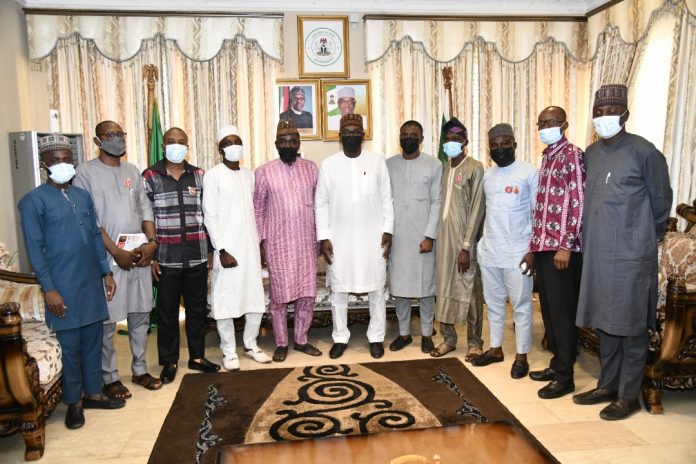A Trip on Digital Journalism, Media Ethics and Responsible Reporting
By Kabir Akintayo
TECHDIGEST –A large contingent from Image Merchants Promotion Ltd (IMPR) – publishers of PRNigeria, Economic Confidential and other titles – recently spent a whole week in Ilorin, the Kwara state capital, where they held a fruitful engagement with Governor Abdulrahman Abdulrazak, and also organised a 3-day training workshop for journalists based in the state on “Digital Journalism, Media Ethics and Responsible Reporting.”
In this special report, Kabir Akintayo shares the thrills, frills and robust intellectual exchanges that took place in the course of the week-long adventure.
“Digital Journalism, Media Ethics and Responsible Reporting” was the theme of a 3-day workshop that took place in Ilorin, Kwara state, last week.
It was a programme put together by IMPR, in collaboration with Penlight Centre for Investigative Journalism. With the supports of the Ministry of Communications and Digital Economy and National Information Technology Development Agency (NITDA) programme is meant to expand the capacity of journalists to stick to the rules of the profession in the face of the threats posed by the overbearing presence of social media, blogs and other unregulated spaces.
It was an intense training of over 40 journalists, publishers and stakeholders in the media industry, thus accommodating all manner of conversations, deliberations, interactions and observations on where the industry is now and where it is going.
The programme is coming at a time fake news has become the order of the day in our polity especially in the aftermath of the 2020 EndSARS saga that almost consumed the nation.
It, therefore, behoves stakeholders in the media industry and other believers in the Nigerian project to put heads together and find lasting solutions to the menace of fake news.
PRNigeria, a leading medium in the fight against fake news recently published “101 Fake News on EndSARS”, book written by one of its staff members, Dahiru Lawal, that further revealed the lies and vicious propaganda tactics deployed by some enemies of the nation who hid under the umbrella of the massive EndSARS rallies.
The platform has been training journalists on online fact-checking, tools used to discover fake news, media monitoring and responsible journalism.
The programme that kicked off in Abuja moved to Kwara state last week and it was a memorable week for everyone – the Government House, the journalists, the visiting IMPR team, NITDA and other stakeholders.
The Government House was the first point of call when the IMPR team hit the city.
The Publisher of PRNigeria and Economic Confidential, Mallam Yushau Shuaib, commended the governor for demystifying governance in the state, adding that his performance was the reason Kwara state was chosen for the second leg of the Workshop.
While speaking, Governor Abdulrahman Abdulrazak commended NITDA for supporting the training programme in the state and commended PRNigeria for its incredible work in spotting and exposing fake news through fact checking.
“I must commend NITDA under the Ministry of Communication for supporting PRNigeria in hosting this programme in Kwara state. PRNigeria has remained consistent in its factual, fair, timely and sometimes exclusive news that make it one of the very credible outlets and the best in Nigeria,” the governor said.
“I actually thought PRNigeria was a government platform based on the very professional and patriotic manner you guys carry out your news writing and reporting. I never knew its privately owned,” the governor added.
He also extended hands of friendship and partnership to PRNigeria for a possible collaboration to train staff of the state civil service and other relevant stakeholders in the state on fact-checking and awareness creation for government activities.
After a successful meeting with the state Chief Executive, attention shifted to Kwara Hotels, the venue of the 3-day training workshop.
Day 1
The first day of the workshop was a massive success, as the resource persons did well to put the participants in the mood for the remaining two days. It was very a rewarding experience.
The first presenter was the famed grand guru of Public Relations in Nigeria, Yushau Shuaib, who spoke on “Digital Journalism, Social Media and Crises Communication.”
The presenter talked about digital Journalism, as in the advent of technology and the relatively easy media operations we have now, unlike the traditional methods that were cumbersome and slow.
Alhaji Shuaib shared his decades of experience with the participants and exposed them to how they can take advantage of social and online media to do their jobs better and avoid fake news and negative reporting that seem to be the disadvantage of the digital age.
The second presenter talked about “Key Issues in Media Management”. Dr Saudat Saleh Abdulbaqi is of the Department of Mass Communication, at the University of Ilorin.
She explained the agenda setting theory and how media actively makes it their priority to set agenda for others to follow. She called on media houses to be responsible and patriotic and use their agenda setting powers to direct the country to the right path, not the path of destruction.
She also shared some key tips on how media houses can maintain standards in their operations and remain relevant in the competitive market.
In his very interactive session, Abdulrahman Abdulraheem reminded the participants about the key ethics of journalism and how to ensure responsible reporting. Using the Nigerian Press Council (NPC) standards, he reminded the participants about the ethics of factual reporting, objectivity, fairness, balance, political neutrality, respect for privacy, protection of minors, editorial independence, protection of sources, avoidance of gratification among others.
While the participants had a robust debate about the practicabilty or workability of some of the above ethical provisions based on their experiences and the challenges they face on the field, the presenter also told them to strike a very good balance between sensational reporting and the need to protect public interest.
He told them to often think twice while covering some sensitive beats like communal clashes, security agencies, Government Houses, and avoid story angles that tend to spread hatred or division, incite people or aggravate an already bad crisis situation, even if those stories are true.
The above point caused a lengthy debate, with some participants insisting that all the reporter owes the society is fidelity to the truth and nothing but the truth, and that they can go ahead and write anything, from any angle irrespective of the consequences on the larger society. At the end of the presentation, the audience finally agreed that at all times, the country has to come first because there have to be peace and stability before the components of the society like the media can function.
There were also other interactions and questions and answers sessions, where journalists compared notes and shared practical on-the-job experiences.
Day 2
The first presenter for the day was Muktar Madobi of Emergency Digest. His topic was “Conflict-sensitive reporting and responsible journalism”.
Mr Muktar is versed in conflict reporting, sharing his experiences on how to measure what to report and what should not to be reported and how to reduce number of casualties in reports to avoid reprisals, in case of communal clashes.
He said conflict reporting is a very sensitive beat that needs to be checked thoroughly and carefully executed.
In his own presentation, Dahiru Lawal, a fact-checking expert and author of “101 Fake News on EndSARS,” took the participants through how they can make use of digital tools to cross-check facts, verify pictures and videos before going to press with any piece of information at their disposal. In a very practical session, he taught the audience how to use Reverse Image Search, Google Earth and other tools to detect fake news, fake pictures and fake videos.
His topic was “Online fact- checking, media monitoring and search engine optimization”.
Stating examples on examining pictures, he used google tools to check the origin of the picture, the geographical location and purpose of the picture.
He demonstrated using google on how to find the location of an incident to verify if actually the event took place at the same location or it’s fabricated.
He said that journalists should not be in a rush to break news, rather, they should check the source of the news, compare to other reliable sources before sharing.
The editor of TechDigest, Mr Inyene Ibanga, also went further into the details of the massive opportunities that abound in the digital space when he presented his paper on “Basic Digital Tools for Journalism.”
The publishers of Solace Base, a popular news websites, shared his personal experiences as a reporter, editor and publishers using the information technological tools to grow and protect his business.
Other resources persons from the academia, media and technology made good presentations of themselves at the digital journalism workshop.
Day 3
At the end of the workshop, participants were presented with certificates of participation and urged to put the training acquired into practice for the betterment of the profession and development of the nation.
A communique was also issued at the end of the 3rd day.
In the communique, the gathering made the following observations:
• Digital journalism, also known as online journalism, is a contemporary form of journalism where editorial content is distributed via the Internet, as opposed to publishing via print or broadcast.
• Digital media is a veritable platform to enhance national interest and security
• Social Media promotes social interaction among citizens and enhance social harmony
• The advent of digital media has transformed the way we receive and share contents and information
• Digital tools provide tools of flexibility to the workforce by enabling out-of-office productivity
• Facilitate creating online communities and groups
• With growing political interference in the media and the rise of user-generated content via social media, it is becoming harder to distinguish between fact and fiction.
• With affordability of mobile phones, charlatans pose as journalists in spreading fake news and hate speech
• Merchants of Fake News use social media more often to confuse, misinform, mislead and betray the target audience
• Sponsored Hate Speech blinds the mind, reinforces sentiments, influences bad judgement and incites mob attacks
• Investigative journalism and fact checking, go hand-in-hand to unravel fake news and elements behind hate speech
• Every media has its editorial and that editorial stands as its position on matters.
• Most media editorials are no longer of Agenda setting but “position positioning.”
• Due to economic challenges, most media houses over-commercialize newsworthy items, negating some of the basic principles of journalism
• Conflict is an inevitable part of life but when not managed properly it could escalate, so Journalists have an important role to play in the mitigation of escalation.
The Workshop therefore came up with the following recommendations:
• Because of the benefits of digital journalism, journalists are urged to embrace latest technologies for efficiency
• The Media should promote public awareness and shape public opinion
• Editorials should influence decision-makers, mobilize support and resources for just causes
• Social Media should be deployed to advocate openly with sincerity of purpose
• As the phenomenon of ‘fake news’ becomes more widespread, journalists must have adequate knowledge and the right fact-checking tools to tackle the menace
• Journalists are urged to respect copyright and disclose sources through credits, links and trackback
• Editors should provide general disclaimer on personal opinions and respect privacy and anonymity of credible sources
• To curb misuse of Social Media, there is need for appropriate legislation, massive enlightenment, public consciousness and deployment of technology (prompt report for sanctions)
• Editorials represent the stand of media organizations but we must be mild through our objectivity in the interest of the public.
• There are so many ways in telling the truth. There is subjectivity in objectivity, but the responsibility lies in analysing trends and predicting the consequences: majority interest or minority segment of the society.
• Managing feedback is essential.
• Journalist welfarism is fashioned out of the African tradition of giving gifts, however it should not be allowed to influence objectivity.
• Journalists must be responsible by being sensitive to and consider the effect of conflict reports before making them public.
• Conflict-sensitive Journalists must be safety and security conscious in the process of our news gathering.
• While urging NITDA to organize the training more often with latest developments, the participants also urged the agency to replicate the Digital Journalism and Fact-Check Workshop in other states of the Federation.
Kabir Akintayo is a Political Correspondent with Politics Digest
















